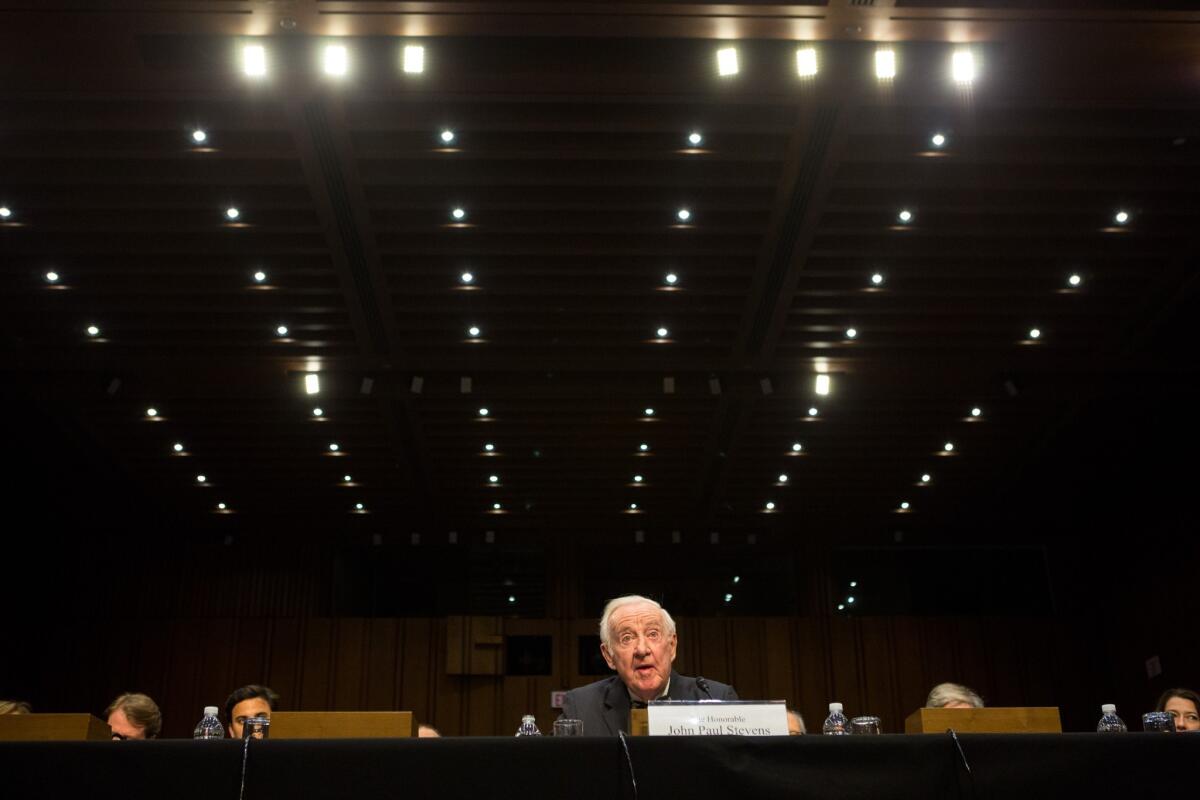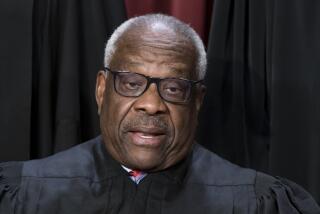Retired Justice John Paul Stevens tells Congress ‘money is not speech’

- Share via
Reporting from Washington — Unlimited campaign expenditures “impair” the democratic process, retired Supreme Court Justice John Paul Stevens told senators Wednesday, urging Congress to amend the Constitution to allow “reasonable limits” on election spending.
The Republican-appointed justice, who last testified before the Senate in his 1975 confirmation hearing, stressed the importance of creating a “level playing field” in elections. Stevens offered five points for enacting an amendment to correct what he views as an “error” in campaign finance jurisprudence originating from the Supreme Court’s decision to overturn limits on campaign spending in its 1976 Buckley vs. Valeo ruling.
“While money is used to finance speech, money is not speech,” Stevens said. “After all, campaign funds were used to finance the Watergate burglaries -- actions that clearly were not protected by the First Amendment.”
Stevens, who led the court’s liberal wing, cast campaign finance rules as a nonpartisan issue and said they would allow elected officials to better serve the public. While Stevens did not mention any recent cases by name, the former associate justice criticized Citizens United vs. Federal Election Commission, a 2010 decision preventing Congress from restricting independent political expenditures made by corporations and unions. Stevens argued regulations should distinguish between funding from constituents and contributions from corporations or out-of-state donors.
“Elections are contests between rival candidates for public office,” he said. “Like rules that govern athletic contests or adversary litigation, those rules should create a level playing field.”
During the hearing, Sen. Charles E. Schumer (D-N.Y.) said Senate Democrats plan to hold a vote this year on a campaign finance amendment written by Tom Udall (D-N.M.).
Schumer said free-speech rights are not absolute, noting restrictions on pornography. Also worth considering, he said, is the concept of “one person, one vote.”
Sen. Ted Cruz (R-Texas), who argued in front of the Supreme Court as a lawyer, praised Stevens’ “incisive” and “friendly” questions but took the opposite position. The tea-party Texan offered a full-throated defense of using the 1st Amendment to protect political spending.
“Money is and has always been used as a critical tool of speech, whether publishing books or putting on events or broadcasting over the airwaves,” Cruz said, noting that restrictions serve only to protect incumbents.
Cruz mocked the current regulatory system in which candidates can’t coordinate with “super PACs,” the same groups that often speak on their behalf. Instead, he called for allowing “unlimited contributions” from individuals but requiring “immediate disclosure.”
Wednesday’s hearing was the first to focus on undisclosed “dark money” since the Supreme Court struck down aggregate spending limits to political parties and candidates in McCutcheon vs. Federal Election Commission this month.
Sen. Angus King (I-Maine), who chaired the inquiry, cited a new report showing a dramatic increase of interest-group ad spending in the 2014 Senate races. Nearly 60% of those ads are sponsored by groups that do not need to disclose their donors, according to a study Tuesday from the Wesleyan Media Project and the Center for Responsive Politics. To run for reelection, King said the average senator must raise from $5,000 to $6,000 every day of their six-year tenure.
Campaign finance advocates, like Schumer, said a constitutional amendment could prove to be an uphill battle.
“It’s a long, hard road,” Schumer told reporters Wednesday afternoon. “But given the McCutcheon decision we feel we have to begin it.”
But attendance at the hearing was sparse, with only about one-third of the committee’s senators present. Trevor Potter, a former FEC chairman and counsel to Sen. John McCain’s presidential bid, said Congress will act when it feels pressure from constituents.
“I would not expect this hearing to be full of senators yet,” Potter said. “What I think needs to happen is the pressure needs to continue to build.”
Former FEC commissioner Donald McGahn and the agency’s current vice chair, Ann Ravel, also testified. Stevens has written a new book with six suggested amendments, including one to permit gun control and another to ban capital punishment.
Michael Memoli contributed to this report.
Twitter: @danielrothberg
More to Read
Sign up for Essential California
The most important California stories and recommendations in your inbox every morning.
You may occasionally receive promotional content from the Los Angeles Times.










